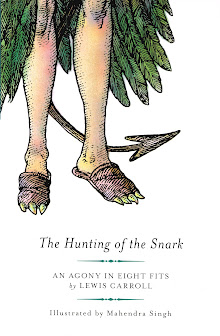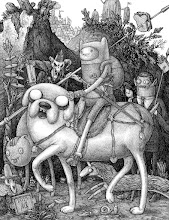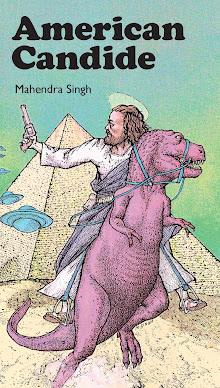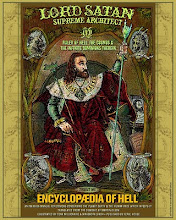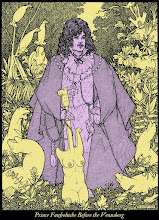skip to main |
skip to sidebar
 Yet still, ever after that sorrowful day,
Yet still, ever after that sorrowful day,
Whenever the Butcher was by,
The Beaver kept looking the opposite way,
And appeared unaccountably shy.The aversion of the Beaver's eyes is motivated by the primitive belief that whatever cannot be seen by oneself, cannot itself see you.* This charming simplicity of thought is the innocent basis of all epistemologies, and it can be said, with some justice, that all of Western philosophy is but footnotes to the nursery-room game of peek-a-boo. And so … we are indulging in a pre-Socratic, pre-school tautology of existential hide-and-go-seek … the Beaver dematerializes her stony-faced surrealist nemesis the Butcher by averting her eyes. Lewis Carroll disarms his Boojum by composing the Snark backwards and thus placing the former into a perpetually receding, invisible future of the latter. As for myself, I'm one of those literal-minded draughtsmen who cannot draw what he cannot see. I shall spurn Rule Number One of Illustration (if you cannot draw it, place a bush in front of it) for I am above such petty stratagems — a plague on all manner of foliage, those leaves, so many, so many, is there no end to them? The naked Boojum shall remain a naked, undrawn, unseeing Boojum.To see a Boojum, ladies and gentlemen, is to be seen by a Boojum! Eschew the lethal gaze of all negating nonentities and all will be well! Focus instead your nondiscerning gaze upon the perfectly rendered nonchalance of this cool drawing. Nothing to see here folks, just move right along.
_______________________________________
*Vide the protosurrealist Andrei Vyshinsky's observation: "The fact that it is dark at night proves merely that I am not paying attention." ("Clinical Morphology of the Parimutuel — Impressions of Mr. Pyridine", Berlin, 1897).

Snarkologists everywhere can rejoice at the September 22nd arrival of LEOPOLD SINGH, a beamish specimen of a young man and a splendid joint effort of my brother Ranjit and his lovely wife Ann. We chortle in our joy!
 The Beaver's best course was, no doubt, to procure
The Beaver's best course was, no doubt, to procure
A second-hand dagger-proof coat —
So the Baker advised it — and next, to insure
Its life in some Office of note:
This the Banker suggested, and offered for hire
(On moderate terms), or for sale,
Two excellent Policies, one Against Fire,
And one Against Damage From Hail.The illustration of these two stanzas has completely exhausted my remaining brain-worker abilities. Purchasing insurance for a lengthy sea voyage in the company of a declared homicidal maniac is standard naval procedure but fiendishly tricky for a landlubber draughtsman such as I. The dagger-proof coat which the Beaver is wearing was the crux of the drawing and easier by far, I decided to indicate its prophylactic function by delineating its essential nature: what goes on inside the dagger-proof coat, stays inside the dagger-proof coat.
Several of my readers have recently communicated to me that they don't "get it", that my written commentaries on the Snark contain "too many references to stuff we don't know about anyway", and finally, that's it all "too surreal". Success at last!
But seriously, big words make my head hurt too, that's why I became an artist. As a child I learned about these gigantic hurtful words and the small-minded hurtful people who use 'em. Whenever someone tries to make my brain hurt-hurt with jaw-jaw, I remember what Humpty Dumpty advised Alice on the subject of big, bad, scary words — "They've a temper, some of them - particularly verbs: they're the proudest — adjectives you can do anything with, but not verbs — however, I can manage the whole lot of them! Impenetrability! That's what I say!'
The egg speaks and having spoken, we obey! Yes, our new watchword shall be: impenetrably-clear.
 The Beaver, who happened to hear the remark,
The Beaver, who happened to hear the remark,
Protested, with tears in its eyes,
That not even the rapture of hunting the Snark
Could atone for that dismal surprise!
It strongly advised that the Butcher should be
Conveyed in a separate ship:
But the Bellman declared that would never agree
With the plans he had made for the trip:
Navigation was always a difficult art,
Though with only one ship and one bell:
And he feared he must really decline, for his part,
Undertaking another as well.
The provenance of this image is, I confess, is a hopelessly adulterated concoction of all the flotsam & jetsam which churns in my head by night:
• Corrupted retinal imprints of an Alma-Tadema confection of Egytian heirophants barging down the Nile.
• Scattered brain-crumb trail of Enobarbus channeling Shakespeare's fancification of Jacques Amyot's crib of Plutarch's précis of Cleopatra a-burning on the water.
• Thomas Mann's Deutsche Bahn-railway-schedule-precise vivisection of the disgraced Joseph's descent down the Nile in the Joseph Tetralogy.
• A muddled childhood memory of Thor Heyerdahl's voyages … over-saturated Technicolor imagery of Incan fellahin poling their islands of bundled reeds across Lake Titicaca, through Upper Egypt and down to Easter Island.
• Most importantly, the compulsion to depict accurately an object of stone floating in water, hence proving it as light as a duck and therefore, a witch.
To those who insist upon a certain logical decorum in the threads binding an image to a text, I say: pshaw! I just rummage through the cultural debris and emotional wheel ruts, happy as a tove in a wabe. If poetry is metaphor, and metaphor is image-making, then there's more critical analysis in one panel of this Snark than in the many pages of intellectual jiggery-pokery with which Lewis Carroll has been belabored through the ages.
On the deck of the HMS Snark, we also can see The Barrister and The Billiard-Marker playing at dice over a fragment of an aortic blood vessel which appears to have been illicitly removed from the person of the poet Dante Alighieri, whose death day is this Friday, September 14. Here's what Witold Gombrowicz, said about Dante and his Divine Comedy, another famous poem about Snarks …
"Dante was reciting his epoch, but the epoch was also reciting, and the poem is, so to speak, a double platitude, the poet simply recited what was already being recited. Something like those Sunday discussions of soccer by people gathered in bars and coffee houses. Do they really care about soccer? Not in the least. … Humanity glides along the worn ruts of articulation. An empty poem, which exists in defiance of reality and almost as if to spite it!"*
Well, doesn't that just about wrap it up for The Meaning of the Snark? I mean, simply substitute Lewis Carroll for Dante (deep inside, you know you really want to) and — voila! A poem about nothing! A drawing about nothing! And whatever it is that you read into the drawing, that's what you truly wanted all along — and thus, deserve!
Yes, yes, yes! I know that Lewis Carroll spoke no Italian outside his bathing machine. And yes, he did claim total ignorance of the meaning of his work, in English or Italian — unlike Dante (Alighieri, not "Wombat" Rossetti), who wouldn't shut up about his boojums. Frankly, I don't know what I'm doing either, it's all the rage these days and I think it's going rather well, it always does when you draw with your eyes wide shut._________________
*W. Gombrowicz, Diary, Volume 3, October 16, 1966, translated by Lillian Vallee, Northwestern Univ. Press, 1993. The works of Gombrowicz are ideal for name-dropping at academic and intellectual soirées, preferably from an upstairs window and attached to an anvil.
NB. The jukebox to your right has been refurbished with two curious versions of Jabberwocky, by Glenn Simonsen. One is a phonetic rendition by an Egyptian, Mr. A. Sayed, the other by Mr. Al Lawler and the Psalters. I've also included a sample of the late Roland Topor explaining the ablative absolute in High Guttural (you may remember him as Renfield in Herzog's Nosferatu, and as the animator of La Planéte Sauvage). Marie Osmond's rendition of Karawane remains, it's the high point of the Hollywood Dada phase of her career.
 He came as a Butcher: but gravely declared,
He came as a Butcher: but gravely declared,
When the ship had been sailing a week,
He could only kill Beavers. The Bellman looked scared,
And was almost too frightened to speak:
But at length he explained, in a tremulous tone,
There was only one Beaver on board;
And that was a tame one he had of his own,
Whose death would be deeply deplored.
Alberto Savinio had this to say about animals such as the Beaver who are always trying to draw attention to themselves:
"Totemism is a sign of the dignity that animals once enjoyed, a testimony that the earth was once a paradise … our memory of the time when animals lived with us as companions and equals contains the most encouraging idea of the future of the world, an idea that lets us glimpse, beyond the contraction of peoples into themselves, their expansion into a common brotherhood, and finally their new merging with the animals in a paradise regained."
In this panel we see the final and ultimate member of the crew, the Butcher, apparently menacing the Beaver in an umbrous manner while she is at her innocent play. Is the Butcher truly malevolent towards the Beaver as the text insinuates or is he pursuing that childish dream of Eden which she rolls before her? Universal brotherhood of sentient beings or ignominous immolation at the hands of a petrified maniac?
Clues abound: the (conveniently) protean decor of the HMS Snark, indeed, the entire mise en scène is redolent of the fashionably unsettled piazzi of Turin, a place notorious for the alpine fogs which beset and befuddle its inhabitants. A similar metaphysical ennui settles heavily over both the Beaver and the hinted-at Butcher, perhaps they are in that liminal state which Savinio alludes to, struggling to emerge from a crepuscular present of totemic mementos into a future Paradise Regained? Is Lewis Carroll hinting at eschatalogical program of redemption here? Is the Hunting of the Snark really a music-hall species of the Divine Comedy, the Snark is Beatrice, the Baker is Dante and the crew of the HMS Snark, a multicephalic crypto-gnostic Virgil?
Or is it all just a load of rubbish, just the useless odds and ends found inside an Oxford don's stolen and pilfered portmanteau, disparate rubbish strewn about the windswept paving stones of an Turinese piazza by a disappointed thief who had been posing as a railway porter on the Bragia trunk line, the better to prey upon Englishmen doing the Grand Tour? Savinio had this to say about the dodgy sort of things that can spring out of a fellow's portmanteau on a chilly Piedmontese morning:
"Romanticism: the terror of nature, its forests, its tempests, its dawns, its splendors … surrealism: the internal terror of a man, his forests, his tempests, his dawns, his splendor."






